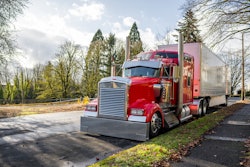Several bills that would increase the maximum weight of trucks under certain conditions are working their way to the U.S. House of Representatives and some have been met with resistance by some industry stakeholders.
A coalition of groups, including the Owner-Operator Independent Drivers Association, penned a letter earlier this month to House Transportation and Infrastructure Committee leaders noting their opposition to any legislation that would increase truck weight or length limits.
The committee this week passed H.R. 3372 anyway. The proposal establishes a 10-year pilot program that would allow a gross weight of up to 91,000 pounds for certain six-axle trucks, or the maximum permitted by bridge formulas. The bill, however, does not allow carriers add more trailers in order to reach the higher weight limits or axle requirement.
States, even those that already allow gross weights of more than 80,000 pounds, have the ability to opt-in and out of the program.
"While we appreciate efforts to gather safety data," said Truckload Carriers Association Chairman and Senior Vice President of Knight-Swift Transportation, Dave Williams, "we have concerns regarding the potential implications of increased truck weights on highway safety and infrastructure."
The industry's largest union expressed similar concern.
"We reject the notion that the only way to determine if heavier trucks are safe is by unleashing them on our roads through the poorly designed, unrestricted pilot program that this legislation allows," Teamsters Freight Division Director John Murphy and Teamsters Carhaul Division Director Avral Thompson said via joint statement. "The Department of Transportation, civil engineers, and drivers have long agreed that heavier trucks pose demonstrable risks to motorists and harm to infrastructure.
"Furthermore, several states already allow trucks that are heavier than the federal limit to operate on their state and local roads. They are cited for safety violations at substantially higher rates and are involved in more severe crashes. We don't need a pilot program to tell us what we already know."
The Carrying Automobiles Responsibly and Safely (CARS) Act (HR 2948) would provide a 10% weight tolerance specifically for stinger-steered automobile transporters hauling heavier hybrid and electric passenger cars to market. Without exceeding federal bridge weight limits, this bill would reduce the number of miles traveled by trucks that currently must complete multiple trips because they are unable to fully load their equipment due to current weight limits.
Both bills were introduced as part of an effort to create efficiencies that come with moving more freight with fewer truck trips, but Williams, again, expressed his concern over what higher weights might mean for infrastructure.
"We remain concerned about the potential consequences of infrastructure and roadway safety that could arise from such weight increases," he said.
House Transportation and Infrastructure Committee passed two more bills that allow trucks to exceed current weight limits. The Dry Bulk Weight Tolerance Act allows a 10% weight tolerance (in vehicles loaded at or below federal weight limits) for dry bulk carriers to account for the shifting of cargo during transit. H.R. 3447 provides a 2,000-pound weight exemption to hydrogen-powered vehicles, similar to the exemption currently applied to both battery-electric and natural gas-powered heavy-duty trucks.











